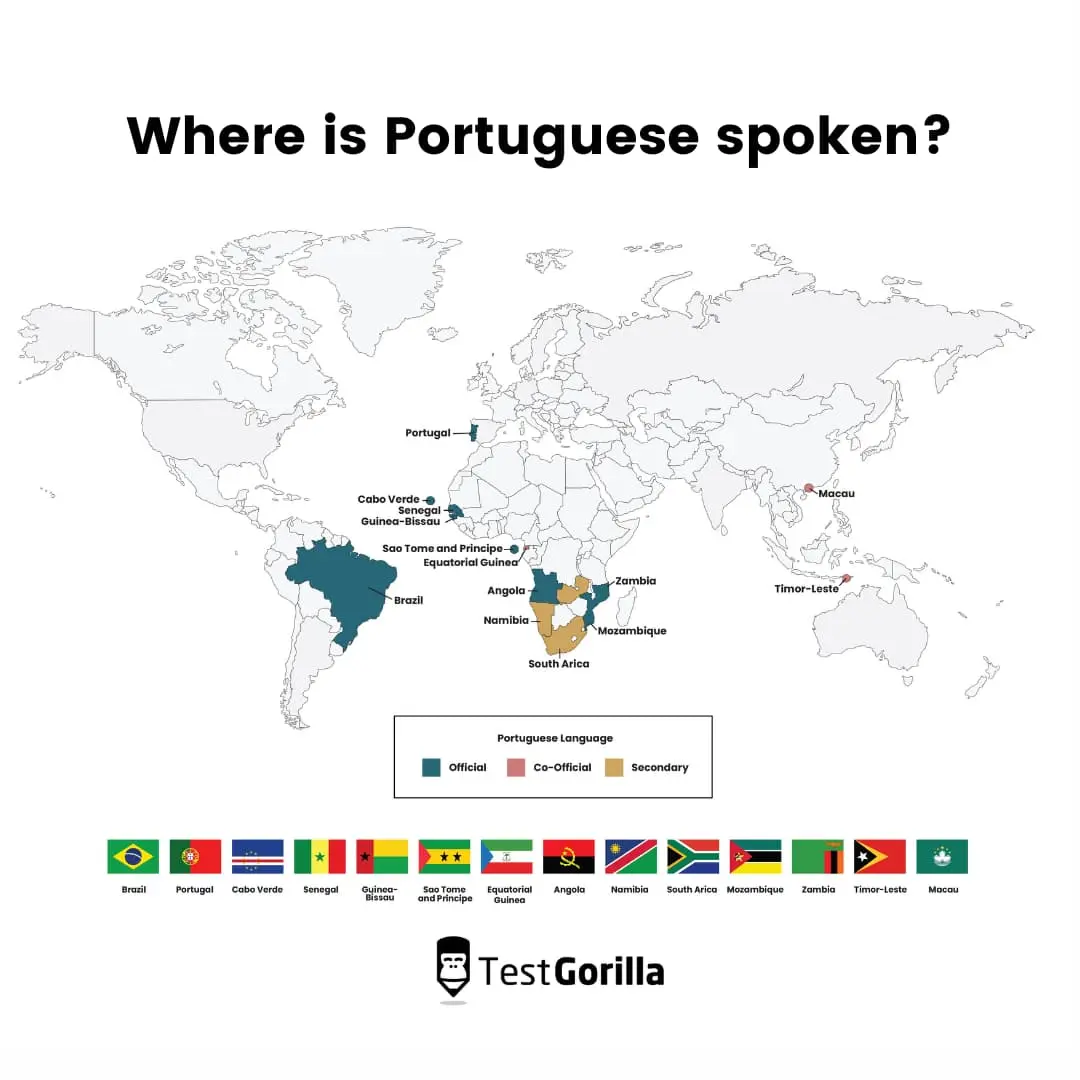If your company is going global, you’ll likely need to hire a workforce that speaks a few different languages – especially for client-facing roles
Portuguese is spoken by approximately 250 million speakers worldwide across different continents, so it’s one of the top languages you should consider when hiring a global workforce.
But how do you assess language proficiency quickly and objectively during recruitment? Relying on candidates’ self-evaluation is risky, and interviewing everyone is extremely resource-intensive.
Thankfully, there’s a better way: Portuguese proficiency tests to the rescue!
With our Portuguese (Intermediate/B1) test, you can efficiently assess applicants’ language skills in Portuguese (as spoken in Portugal) at the B1 level of the Common European Framework of Reference for Languages (CEFR).
In this article, we’ll cover how you can evaluate candidates’ Portuguese language skills and give you a step-by-step guide for hiring Portuguese speakers for your organization.
Table of contents
Why is Portuguese important for businesses today?
E-commerce is rapidly growing in Portugal and across other Portuguese-speaking markets. This means that if you’re selling products and services online and are looking to build a global presence, Portuguese might be one of your go-to languages when it comes to hiring new talent.
Portuguese is among the top 10 most widely spoken languages in the world, so if you’re looking to expand into the global market, you’ll certainly need to consider hiring Portuguese speakers to better serve your customers.
The language is used by 250 million native speakers worldwide in many countries, including Portugal, Brazil, Angola, Cape Verde, São Tomé and Príncipe, Mozambique, Guinea-Bissau, Equatorial Guinea, East Timor, and Macau. This has opened the door for many expansion opportunities into diverse economies, some of which are growing quickly.
To expand into a Portuguese-speaking market, however, you need to have the right people on your team who have the necessary language skills to serve your customers.
How can you assess Portuguese proficiency during hiring?
If you’re looking to hire Portuguese speakers for your business, you definitely need to be able to assess their language skills reliably.
So, how do you evaluate whether a candidate speaks Portuguese at the right level for the role you’re looking to fill?
There are a few ways to evaluate candidates’ language skills beyond relying on their self-evaluation:
1. Ask for diplomas or certificates
The first and most common way to assess language skills is to ask candidates to provide some sort of proof that they speak the language, such as a DEPLE (B1), DIPLE (B2), or DAPLE (C1) diploma in Portuguese.
Keep in mind, however, that language certificates only attest to a person’s language skills at the moment they took the exam. A few years down the road, they might have forgotten nearly everything.
2. Use language skills tests
Portuguese fluency tests are a quick and reliable way to assess applicants’ proficiency in Portuguese at the level required for the job. Candidates can take language tests remotely at their convenience, and you can use the test results to evaluate their fluency level objectively.
To assess your applicant’s Portuguese language skills, you can use our Portuguese (Intermediate/B1) or Portuguese (Proficient/C1) test.
3. Interview candidates
Interviews can be useful for evaluating candidates’ spoken language skills, but they are also resource-intensive. For this reason, it’s best to conduct interviews at the bottom of your hiring funnel after candidates complete skills tests. You should only interview your best applicants who have the skills you need.
A B1 or B2 level of language proficiency is sufficient for some jobs – but for others, you might need to make sure candidates are fluent in the language (i.e., have a C1-level proficiency).
What does a B1 level in Portuguese mean?
The B1 level is also referred to as “lower intermediate” in the CEFR language proficiency model.
It indicates that a candidate has more knowledge of the language than someone at an A1 or A2 level (basic use of the language) but less than someone at the B2, C1, or C2 level (advanced proficiency).
At a B1 level, candidates are able to:
Understand simple instructions in written and spoken form, ask questions, and provide basic information
Understand and participate in conversations about familiar topics, such as work, travel, leisure, and food
Handle most day-to-day situations in a country where the language is spoken if others speak slowly and clearly
Write simple text on familiar topics, enabling them to communicate via email or text chat
Explain their point of view, provide additional details or examples, describe events, and give directions or instructions
Candidates at a B1 level might still make grammatical or syntax errors or be unable to deal with more complex situations or discussions in person or over the phone. They might not be able to differentiate between or understand all Portuguese accents but have sufficient skills to respond appropriately when others speak clearly about familiar topics.
You can use a B1 Portuguese language test to hire applicants for client-facing roles if employees are expected to stick to a familiar script or discuss a range of topics that aren’t too complex.
Give the test to candidates for roles like customer service agents, sales representatives, and any other position that requires them to speak Portuguese at an intermediate level.
How to hire Portuguese speakers: a step-by-step guide
In this section, we’ll guide you through the process of hiring Portuguese speakers quickly, efficiently, and without bias.
The good news is that if you need to hire people who speak other languages, you can follow the exact same process – just use the relevant language proficiency test from our test library to assess candidates’ language skills in Swedish, French, Dutch, Spanish, Polish, and more.
Here’s your blueprint for hiring Portuguese speakers:
Write a job description: What’s the job you’re hiring for, and which key skills do applicants need to be successful? What are the job’s core responsibilities?
Determine the proficiency level needed for the role: Do you need an intermediate-level Portuguese speaker or someone who’s proficient with the language? This will determine whether you should use the Portuguese (Intermediate/B1) or Portuguese (Proficient/C1) test.
Post a job ad and collect applications: Write a job ad based on the job description from step 1, and post it on relevant international and local job boards. Then start collecting applications.
Build a skills assessment: Create a skills assessment featuring the right Portuguese fluency test (B1 or C1, depending on the required level of proficiency), along with other tests as needed. With TestGorilla, you can combine up to five tests in a single assessment. You also have the option to add custom questions or even create custom tests.
Invite applicants to take the skills assessment: Send the skills assessment to your applicants. Explain the purpose of the assessment (to evaluate their skills fairly and objectively) and the next steps of the hiring process. Providing enough context to applicants helps improve candidate engagement and the overall candidate experience. You don’t need to review CVs in parallel to skills testing – you can simply send your assessment to all applicants.
Analyze results and identify your best applicants: Next, look at the test results and shortlist your best candidates – those who have the necessary language skills, meet your other criteria for the role, and have shown a strong potential to perform well on the job.
Interview shortlisted candidates: Conduct structured interviews with selected candidates to gain a deeper understanding of their strengths and experience. Structured interviews help you limit bias and stay objective.
Assess the results and make a hiring decision: Look at the data you’ve collected so far from interviews and skills assessments, and discuss it with your hiring team. By now, it should be easy to identify your top performers and make a decision.
Extend an offer to your best applicant: Negotiate conditions and a start date with your best applicant, and prepare to onboard them.
Inform unsuccessful applicants: Recruiters who simply vanish and never inform unsuccessful candidates of the status of their application inadvertently create a negative candidate experience and harm their employer brand. Sending a message to all applicants to thank them for their time will help you stand out among employers and not burn any bridges.
Use an online language test to hire Portuguese speakers the easy way
Online skills tests are an easy way to sift through applications and identify the candidates who have the necessary skills and language proficiency level – without spending hours screening CVs, relying on self-evaluations, or interviewing each candidate.
If you need to hire intermediate Portuguese speakers for your organization, you can simply use TestGorilla’s Portuguese (Intermediate/B1) test to evaluate applicants’ language skills – and hire the best without bias.
Related posts
Hire the best candidates with TestGorilla
Create pre-employment assessments in minutes to screen candidates, save time, and hire the best talent.
Latest posts
The best advice in pre-employment testing, in your inbox.
No spam. Unsubscribe at any time.

Hire the best. No bias. No stress.
Our screening tests identify the best candidates and make your hiring decisions faster, easier, and bias-free.
Free resources
This checklist covers key features you should look for when choosing a skills testing platform
This resource will help you develop an onboarding checklist for new hires.
How to assess your candidates' attention to detail.
Learn how to get human resources certified through HRCI or SHRM.
Learn how you can improve the level of talent at your company.
Learn how CapitalT reduced hiring bias with online skills assessments.
Learn how to make the resume process more efficient and more effective.
Improve your hiring strategy with these 7 critical recruitment metrics.
Learn how Sukhi decreased time spent reviewing resumes by 83%!
Hire more efficiently with these hacks that 99% of recruiters aren't using.
Make a business case for diversity and inclusion initiatives with this data.






















